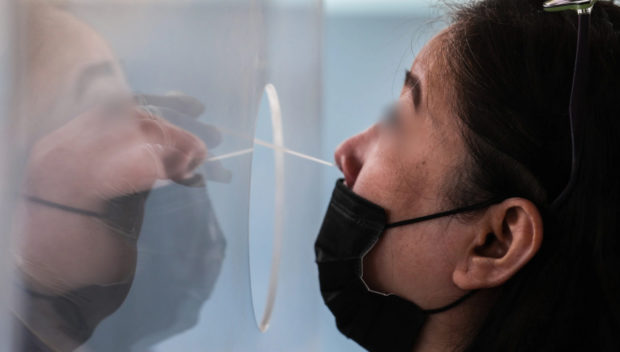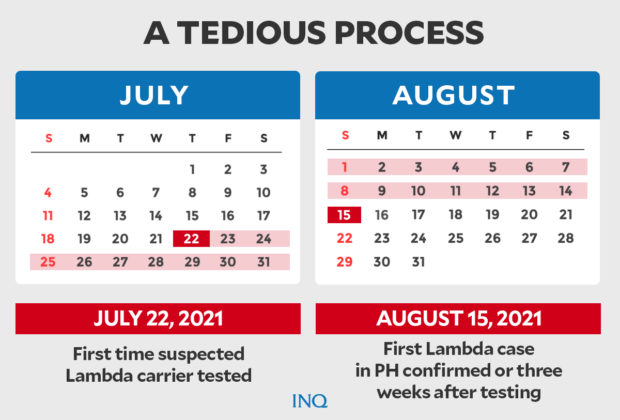
A resident of Cavite province goes through respiratory sample collection courtesy of the free antigen testing program of the Office of the Vice President. PHOTO FROM OVP
MANILA, Philippines—The Lambda and Delta variants of the virus SARS Cov2, which causes COVID-19, are different in many ways but share two things in common—both are now in the Philippines and the gap between testing and detection of those took weeks.
A day after the Department of Health (DOH) announced the detection of the first case of the Lambda variant, Health Undersecretary Maria Rosario Vergeire narrated some details of the case.
READ: DOH detects first case of Lambda variant; reports 182 additional Delta cases
In a radio interview over DZMM on Monday (Aug. 16), Vergeire said that the first Lambda variant in the country is a local case, not from a returning overseas Filipino.
“This came from a cluster of cases in a specific locality that’s why we included in the whole genome sequencing,” she said.
The patient is a 35-year-old pregnant woman, who Vergeire said tested positive in July yet.
“Let me just inform the public that this 35-year old was already detected on July 22. So on July 22, we already started contact tracing,” Vergeire explained.
“We just now found out that it is a Lambda variant. We continue the contact tracing and collecting samples for genome sequencing,” she added.
On July 6, Health Secretary Francisco Duque III assured the public that the Lambda variant has not yet been detected in the Philippines.
READ: No Lambda variant yet in PH – DOH
From the date the 35-year-old tested positive for SARS Cov2 until Sunday (Aug. 15) when it was confirmed to be a case of Lambda variant, it took at least three weeks to confirm.
What went before
The Philippines’ first cases of the more transmissible Delta variant were first detected and announced in the same way.
On May 11, the DOH said that the first Delta variant case was that of a 37-year-old male returning overseas Filipino from Oman. He arrived in the Philippines on April 10 and was tested on April 15.
The second case was a 58-year-old Filipino male who came from the United Arab Emirates who arrived last April 19 and tested positive for COVID on April 24.
READ: First 2 COVID-19 India variant cases in PH confirmed
This means that the first case was confirmed to be a Delta variant only after around three weeks while the second case took over two weeks to confirm.
Last month, on July 16, the health department detected the first local cases of Delta variant in the country.
READ: PH logs first local Delta cases; 1 dies, 10 recover
As of August 15, an additional 182 cases of Delta variant were logged by the DOH, bringing the total number of the more transmissible variant cases to 809.
It still takes time
In March, the DOH explained that positive cases of new COVID variants are not immediately released since the process involved in genome sequencing of respiratory samples that are positive for the virus takes time.
“Samples are carefully selected to provide the best yield of the sequencing efforts,” said Vergeire.
“Thus not all RT-PCR positive samples qualify for WGS and it takes about a week to complete WGS,” Vergeire said in a statement. She was referring to reverse transcription-polymerase chain reaction, considered as the most reliable COVID test method, and whole genome sequencing, the process of identifying the virus variant.
The process of testing and confirmation, Vergeire said, was time-consuming.
“Selection alone to see if the RT-PCR samples are viable, arranging transportation and other operational concerns also take time,” she said. Viable samples have a CT threshold below 30.
“But we are doing the best we can to facilitate this WGS where it is needed most,” Vergeire said.
READ: Genome sequencing for COVID-19 positive samples takes time
In a separate statement, Vergeire said that the University of the Philippines-Philippine Genome Center (UP-PGC) could run only 750 tests on samples per week.
Last July 20, the DOH said additional machines and skilled personnel have been acquired and added to ramp up and improve the country’s genome sequencing.
The UP-PGC on July 27 said it needed at least P100 million to expand its satellite facilities in Visayas and Mindanao for genome sequencing and detecting SARS Cov2 variants.
READ: UP-PGC needs P100M for genome sequencing in Visayas, Mindanao
TSB


